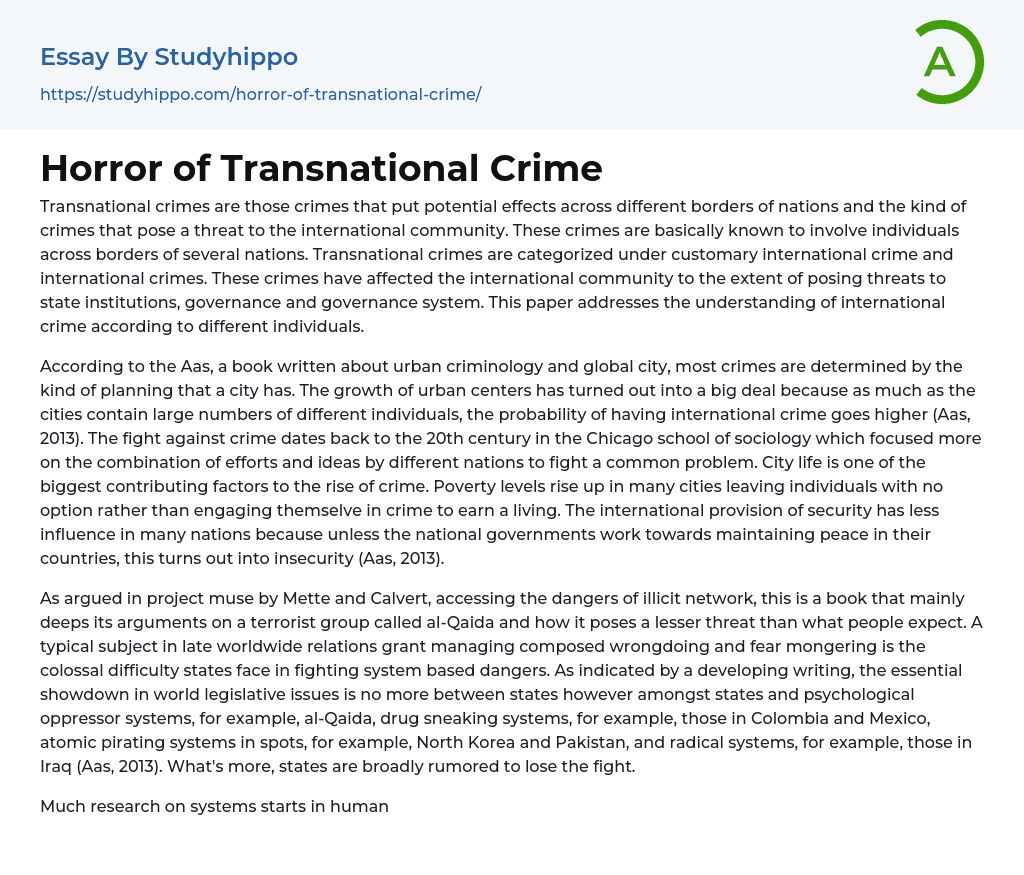Transnational crimes are crimes that have potential effects across borders and pose a threat to the international community. These crimes involve individuals across multiple nations and are categorized under customary international crime and international crimes.
These crimes have had an impact on the international community, posing threats to state institutions and governance systems. This paper examines different perspectives on international crime. Aas, in his book about urban criminology and global cities, argues that the planning of a city plays a significant role in determining the occurrence of crimes. The expansion of urban centers has become a major concern because, with a large population of diverse individuals, the likelihood of international crime increases (Aas, 2013).
The fight against crime in the 20th century originated from the Chicago school of sociology, which emphasized international cooperation to comb
...at a common issue. Crime rates tend to escalate in urban areas, driven by factors such as poverty and limited income opportunities. The provision of security at an international level is limited in its effectiveness, as national governments bear the primary responsibility for maintaining peace within their own countries (Aas, 2013). Examining the risks posed by illicit networks, as discussed in Mette and Calvert's book on al-Qaida, challenges the perception of this terrorist group as a significant threat. In the field of global relations, scholars often confront the significant challenge that states face in combating network-based menaces.
The growing concern in world politics is that the main conflict is no longer between states, but between states and terrorist systems like al-Qaida, drug smuggling systems in Colombia and Mexico, nuclear piracy systems in North Korea and Pakistan, and radical systems in Iraq (Aas, 2013). States
are widely believed to be losing this battle. Research on systems often originates from sociology and organizational theory, which is crucial for understanding why systems are considered to be so effective in international relations. Economic sociologists often use the concept of a system to analyze the shift away from the traditional model of a vertically integrated arm that relies on top-down management, bureaucratic agendas, and centralized investment to minimize transaction costs (Aas, 2013).
One important issue in systems is the crucial decision-making process. In theoretical literature, systems have the ability to adapt and adjust their organization and operations as the environment changes. However, real-life systems are not likely to be as intelligent. Studies on criminal networks highlight their resistance to infiltration and dismantlement.
Mohajerani (2014) examines Gangster's Paradise by Peter Andreas, which explores the hidden narratives of domestic and international crime. The book highlights how globalization has actually facilitated various illegal activities, such as drug trafficking, tax evasion, stolen goods and intellectual property smuggling, human trafficking, and money laundering. While some of these activities pose challenges for law enforcement agencies, others have significant security implications on a global scale.
The impact of transnational crime and illicit trade is evident worldwide, affecting individuals, communities, and governments alike. Wimmer (2016) notes that this also applies to the United States. However, it is important to note that in Washington there is a prevailing discourse centered around fear and the use of aggressive law enforcement strategies to combat these issues. It is argued that such a response may be excessive when considering the actual circumstances at hand.
The text emphasizes the importance of understanding and evaluating transnational crime in relation to globalization. Mohajerani
(2014) argues that it is crucial to examine history as it is often overlooked in current discussions on this topic while correcting misconceptions about recent developments. This historical evaluation helps Americans comprehend their past, present, and future, as ongoing battles over illegal trade will continue shaping the United States' relationship with its neighbors and the rest of the world.
However, focusing solely on foreign traders and bolstering border enforcement will have little impact without addressing the demand for illicit goods that drives underground economies across borders. Wimmer (2016) suggests that America's reliance on cheap labor and mind-altering substances plays a significant role in this issue. Viewing these problems solely as outcomes of transnational wrongdoing rather than considering outdated market directions for work, an ineffective immigration system, overly strict drug control measures, or failures in education and public health policies will result in minimal progress for the United States.
Reference
- Aas, K. F. (2013). Globalization and crime SAGE Publications Limited
- Mohajerani, S. M. (2014). Negotiating with Terrorists: Challenge of Structure Int'l Stud J., 11, 125
- Wimmer, A. (2016).
The Jakarta Sarinah Attack took place on 14 January 2016, signaling the imminent arrival of the Khilafah.
The authors of the attack were Van Dijk, J. J. M., Spapens, A. C. M., Albanese, J., and Reichel, P.
(2013) Transnational organized crime networks across the world. Transnational organized crime, 7-27.
- Animal Cruelty essays
- Charles Manson essays
- Crime Prevention essays
- Crime scene essays
- Criminal Justice essays
- Criminology essays
- Cyber Crime essays
- Damages essays
- Detention essays
- Distracted Driving essays
- Drug Trafficking essays
- Drunk Driving essays
- Forensic Science essays
- Gang essays
- Hate Crime essays
- Homicide essays
- Identity Theft essays
- Juvenile Crime essays
- Juvenile Delinquency essays
- Juvenile Justice System essays
- Law Enforcement essays
- Murder essays
- Organized Crime essays
- Penology essays
- Piracy essays
- Prison essays
- Property Crime essays
- Prostitution essays
- Punishment essays
- Punishments essays
- Rape essays
- Robbery essays
- Serial Killer essays
- Sexual Assault essays
- Sexual Assault on College Campuses essays
- Sexual Harassment essays
- Sexual Offence essays
- Stealing essays
- Surveillance essays
- Ted Bundy essays
- Victim essays
- Violent crime essays
- White Collar Crime essays
- Afghanistan essays
- Africa essays
- America essays
- Asia essays
- Australia essays
- Caribbean essays
- City essays




